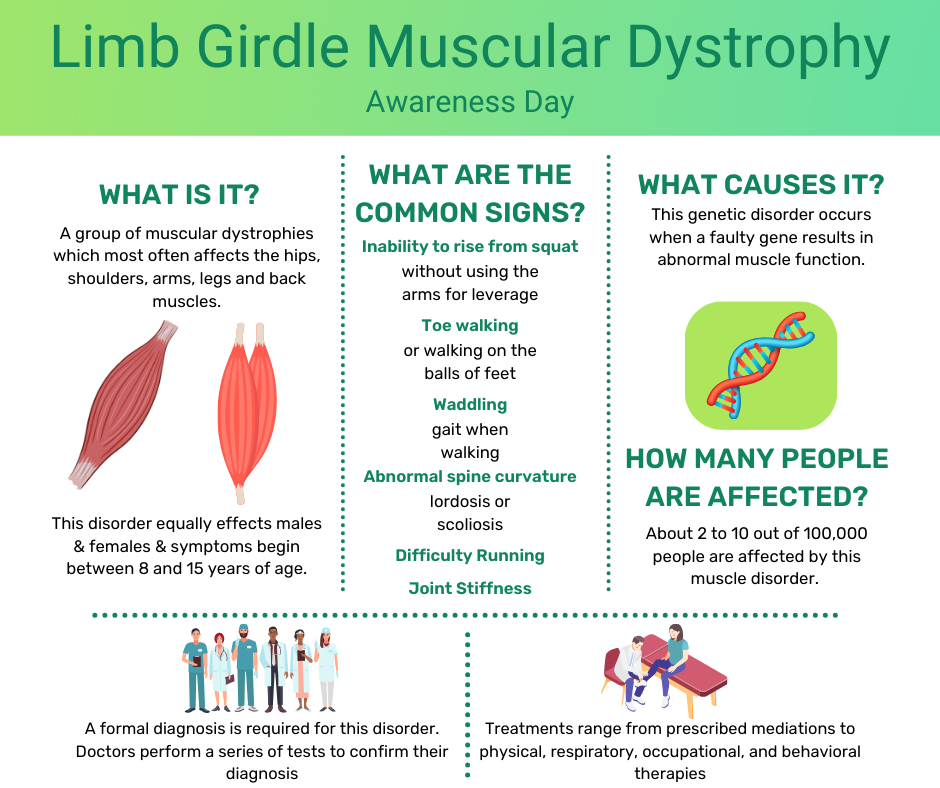Tag: genetic disorder
Limb Girdle Muscular Dystrophy
September 29, 2023What is Limb Girdle Muscular Dystrophy?
Limb Girdle Muscular Dystrophy is a group of muscular dystrophies which can be inherited in various ways. It equally effects males and females and symptoms begin between 8 and 15 years of age. About 2 to 10 out of 100,000 people are affected by this muscle disorder which leads to muscle weakness and muscle wasting of varying severity. Most commonly the shoulder and pelvis muscles are affected and as it progresses the hips, shoulders, arms, legs, and back muscles all weaken. The symptoms are known to progress slowly and while there is no cure the life expectancy of an individual with this diagnosis is generally within a normal range since the heart and breathing muscles are not affected.
How do I know if my child has Limb Girdle Muscular Dystrophy?
The signs and symptoms of people with Limb Girdle Muscular Dystrophy can vary widely. Even among individuals within the same family there is a good chance that the signs and symptoms will not be the same. Since symptoms can begin at any age, it’s important to keep an eye out for these common signs throughout your child’s life:
- Inability to rise from a squatting position without using the arms for leverage
- Toe walking or walking on the balls of their feet
- A waddling gait when walking
- Difficulty running
- Joint stiffness
- Abnormal spine curvature (lordosis/scoliosis)
Because these signs and symptoms are common in other muscular dystrophies, it is critical to see a medical doctor and receive a formal diagnosis so that proper treatment can be obtained. The formal diagnosis is based on symptoms, symptom severity, age at which the symptoms began, and family medical history. Doctors will perform a series of tests including: electrodiagnostic tests, laboratory tests, muscle biopsies, imaging studies, electrocardiograms, and genetic testing to confirm their diagnosis.
What Causes Limb Girdle Muscular Dystrophy?
Limb Girdle Muscular Dystrophy is a neuromuscular genetic disorder that occurs when a faulty gene results in abnormal muscle function. Many genes have been identified as contributing to this disorder so while it can be passed from parent to child, the child also could be the first in the family to have muscular dystrophy.
What are the complications of Limb Girdle Muscular Dystrophy?
While it is rare for Limb Girdle Muscular Dystrophy to affect the heart, lungs, digestive system, or other body systems outside of the muscles, it is possible. Any time the heart or lungs are affected by muscular disorders there is a chance that life expectancy will be negatively affected.
What is the treatment of Limb Girdle Muscular Dystrophy?
While there is no cure for Limb Girdle Muscular Dystrophy there are treatments for it. Treatments range from medications that are prescribed by medical professionals to help relieve symptoms relating to Limb Girdle Muscular Dystrophy to physical, respiratory, occupational, and behavioral therapies to help reduce the process of muscle weakness and wasting. Treatment is individualized for each patient and designed to enhance quality of life.
If you child has been diagnosed with Limb Girdle Muscular Dystrophy and you are interested in learning more about how Schreiber’s Pediatric Therapies can help your child visit: http://www.schreiberpediatric.org/therapy-services/
As a nationally recognized pediatric facility, the Schreiber Center for Pediatric Development provides family-centered education and therapy programs for infants, children and adolescents with disabilities, developmental delays, and acquired injuries. Our goal-oriented approach maximizes each child’s ability to function independently within the community.
